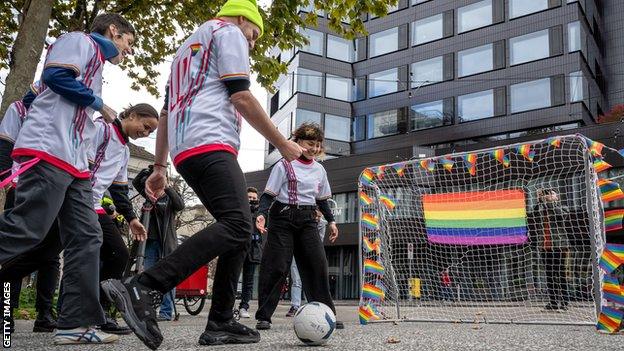World Cup 2022: Qatar ambassador comments on homosexuality 'harmful and unacceptable'
- Published

LGBTQ+ rights activists protested against the Qatar World Cup outside Fifa's museum in Zurich on Tuesday
A Qatar World Cup ambassador calling homosexuality "damage in the mind" is "harmful and unacceptable", says Human Rights Watch.
Former Qatar international Khalid Salman told German broadcaster ZDF that LGBTQ+ people attending the tournament should "accept our rules".
Homosexuality is illegal in Qatar because it is considered immoral under Islamic Sharia law.
Salman said: "[Homosexuality] is haram. You know what haram [forbidden] means?"
When asked why it was haram, he added: "I am not a strict Muslim but why is it haram? Because it is damage in the mind."
The interview, which is part of a documentary set to be broadcast on Tuesday, was then stopped by an accompanying official.
Rasha Younes, LGBT rights senior researcher at Human Rights Watch, said: "Salman's suggestion that same-sex attraction is 'damage in the mind' is harmful and unacceptable.
"The failure of the Qatari government to counter this false information has a significant impact on the lives of LGBT residents of Qatar, ranging from fuelling discrimination and violence against them to justifying subjecting them to state-sponsored conversion practices."
There is concern about how LGBTQ+ people are treated in Qatar, where same-sex relationships and the promotion of same-sex relationships are criminalised, with punishments ranging from fines to the death sentence.
The host country's World Cup organisers have stated "everyone is welcome" to visit the country to watch the matches and claimed no-one will be discriminated against.
However, Qatar 2022 chief executive Nasser al Khater has said the government would not change its laws on homosexuality, requesting visitors "respect our culture".
The Gulf State, where the World Cup will take place from 20 November to 18 December, has also been criticised for its human rights record and treatment of migrant workers.
World Cup 'should not' have gone to Qatar - Sepp Blatter
Fifa recently wrote to competing nations asking them to "now focus on the football" instead of the competition's controversial build-up.
The letter, which was signed by Fifa president Gianni Infantino, was criticised by Human Rights Watch, Amnesty International and LGBTQ+ campaigners in England and Wales, while 10 European football associations - including those of England and Wales - said "human rights are universal and apply everywhere".
However, Conmebol, the South American football confederation, says it is "time to leave controversies behind".
LGBTQ+ campaign group All Out called on Fifa to "end the silence and hypocrisy" following Salman's comments.
At a protest outside Fifa's museum in Zurich, a spokesperson from All Out said: "This comes days after All Out and others have presented testimony from LGBT+ Qataris of abduction, detention without trial, torture and conversion practices taking place in recent weeks.
"But Fifa president Infantino is still saying that everyone will be welcome at the World Cup.
"With just two weeks to go until the football starts, it is time for Fifa to stop looking away and take responsibility.
"It is time for Fifa to end the silence and hypocrisy. It is finally time for human rights to be put ahead of greed. The world is watching."
Human Rights Watch recently released a report, external saying that Qatari security forces are continuing to arrest citizens who are gay, lesbian, and transgender, sometimes forcing them to undergo conversion therapy.
Qatar's government has said the report contains false allegations.
LGBTQ+ charity Stonewall's director of communications and external affairs Robbie de Santos said human rights were being "disregarded and disrespected".
Speaking to BBC World Service's Sport Today, he added: "It's surprising and disappointing the Qatar authorities have given assurances to the United Nations and other multilateral bodies about respecting human rights during the tournament and making commitments to social progress, and what we're seeing is those commitments are not being kept on with.
"That's why it's so important that all of us are listening globally and following the tournament and knowing that football really is everyone's game, that we all speak."
BBC Sport has contacted Fifa and the World Cup organising committee for comment.